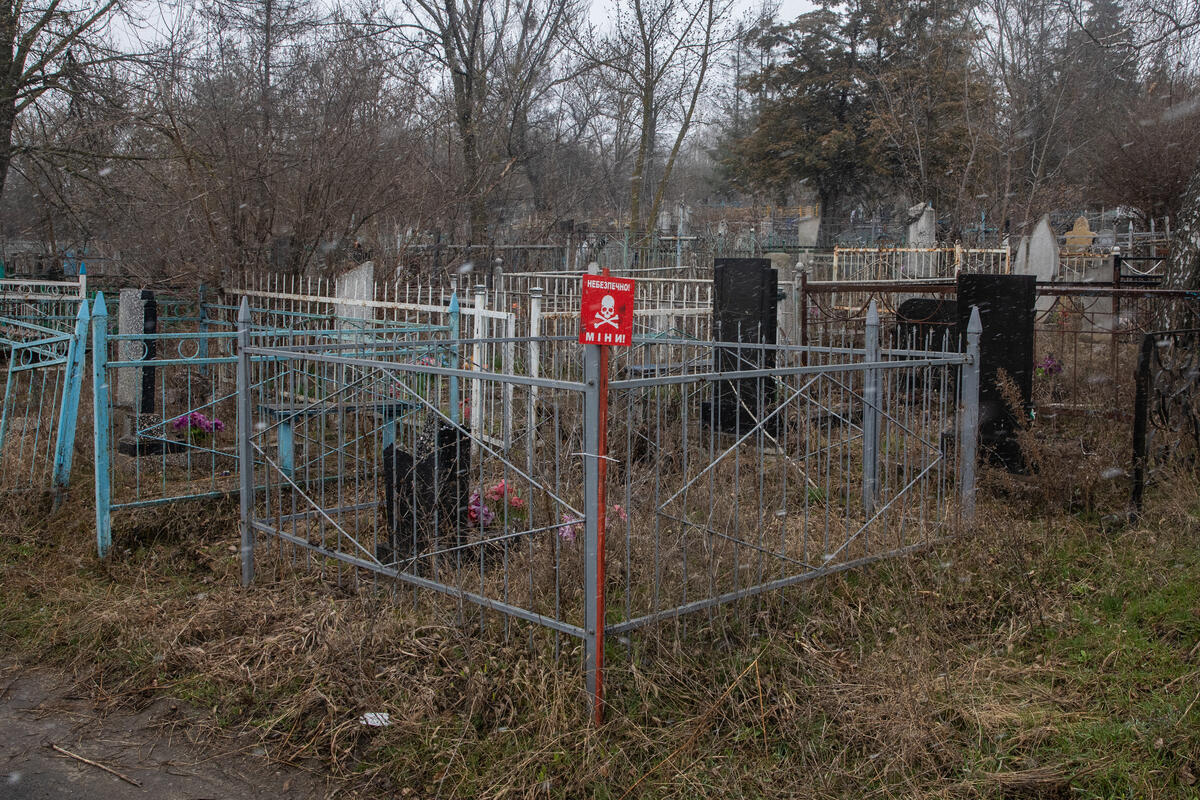
A mine warning sign at the entrance to the cemetery in the city of Izium, Kharkiv region.
- 16-year-old *Ihor’s family car exploded on a landmine when driving to fetch water.
- 8-year-old *Veronika’s father stepped on a mine while clearing backyard after shelling.
- “We have to convey to children that there are no safe explosive items”, said Yevhen, mine-risk instructor from Ukraine.
1 in 8 civilians killed or injured by landmines and unexploded ordnances is a child, Save the Children said today, which marks International Day for Landmine Awareness and Assistance in Mine Action. According to the UN, since war escalated in February last year, there have been 758 verified casualties caused by remnants of war in Ukraine – of which nearly 12% are children.
Mine accidents are now reported daily, and there have been 126 verified casualties over the last month and a half — or an average of 3 civilians killed or injured by explosive remnants of war per day.
Before the war erupted, Ukraine was already one of the most mine-contaminated countries in the world. Since then, contaminated land has risen tenfold, taking up 30% of the land in the country, or around 180,00 square kilometres, an area twice the size of Portugal or equal to the state of Florida in the US.
Children in Ukraine are at increasing risk of treading on a landmine or picking up part of a munition, and therefore sustaining life-changing injuries or death. On March 29, a 16-year-old boy was reportedly killed among 4 total casualties as a car rode over a mine on a dirt country road in Kharkiv region.
The same happened to Ihor’s family when they were driving to fetch water from a local well. A landmine exploded under one of the wheels. Luckily, the family survived.
“We have already gone [to the well], we have fetched water and then we drove by car and somehow found a mine. It is unclear where it came from. Every time you go out, you watch your steps. No more walking along paths, no more picking berries or mushrooms — you can forget about it for a very long time. All the forests and fields around are completely strewn with [explosives]. Every sort of shell was flying around and falling down. Therefore, we only walk along roads that deminers have already examined more than once,” — Ihor’s mother Tamara* recounts.
This is also the case for Veronika*, 8, whose father lost his leg after he stepped on a mine that had landed in their garden. Veronika’s* mother says every household around their hometown has been affected by explosives.
“[I enjoy] playing outside and riding a bike, [but I can only do it] on the road with parents. They stay with me all the time and watch where I am riding”, – Veronika* says.
As Spring weather is setting, melting snow and rains will expose buried landmines and fragments of unexploded shells and artillery. This lethal landscape will prove highly dangerous for children, who will spend more time outdoors. In February, 8 adolescents were wounded after a 16-year-old played with a mine on a bus-stop in Izyum.
To educate children about the risks of explosives, Save the Children distributes educational leaflets about mines and runs awareness sessions in schools across Ukraine.
“First of all, we have to convey to children that there are no safe explosive items. They are all dangerous, it is forbidden to approach them, to touch them. [We teach children] how to recognize contaminated area or a lone explosive, and what to do when they are spotted,” says Yevhen, the instructor for Ukrainian Deminers Association. “It is very important that they [children] live long and happily, and do not expose themselves to danger.”
Olha*, 16, a school student from Kyiv region, says: “We will live with this problem [mines and unexploded ordinance contamination] for a very long time. And every person who is now living around here should understand that it is very dangerous and know the rules that can save their life.”
Contaminated land also makes it difficult to move humanitarian supplies across land to families who need it most, and prevents people from fleeing on foot when fighting intensifies. Over 10 million people in Ukraine need help with mine services such as clearance and victim support, according to the UN’s Mine Action group.
Sonia Khush, Save the Children’s Ukraine Country Director, said:
“As spring draws near in Ukraine, it is shocking that children who should be playing and socialising safely outside are exposed to the constant, deadly threat. Whether it is an unexploded munition they might occasionally pick up and play, or a mine exploding beneath them – all of that may cause permanent, life-changing injuries, or death.
“Landmines do not discriminate between a child or a soldier – their use violates international law, poses a grave risk to children, and additionally hampers the ability to transport humanitarian aid to where it is needed most.”
Save the Children calls on all parties to refrain from the use of explosive weapons with wide area effects in populated areas andtake stock of the impact on civilian populations in the planning and conduct of military activities. Mines and other explosive ordinances pose a serious risk to children and hamper possibilities of development of those mine affected areas.
*Names changed to protect identities.
